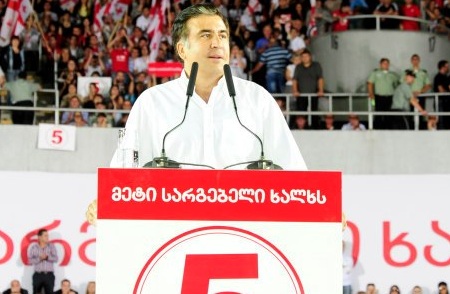Bidzina Ivanishvili, the leader of what appears to be the winning coalition in Georgia’s parliamentary election yesterday, is Georgia’s wealthiest man, with an alleged net worth of $6.4 billion, but until he formed his opposition group last year, however, Ivanishvili was not an incredibly well-known public figure.![]()
Now, however, as the head of what is expected to be the largest group in Georgia’s parliament, the Georgian Dream — Democratic Georgia party (k’art’uli ots’neba–demokratiuli sak’art’velo, ქართული ოცნება–დემოკრატიული საქართველო), Ivanishvili (pictured above) is set to become the most important political player in Georgia.
Diplomats from Brussels to Berlin and from Moscow to Washington, D.C. are now attempting to discern where Bidzina hopes to take Georgia.
Although the small nation in the Caucuses has a population of just 4.5 million, it is an incredibly strategic country and has played an outsized role in world affairs. That role has been especially outsized since current president Mikheil Saakashvili came to power in 2003 in the wake of the ‘Rose Revolution’ that ushered former president Eduard Shevardnadze out of power and brought to Georgia a new era of legal and democratic reforms, however imperfect, and a liberalized and dynamic economy where corruption has been much reduced.
Saakashvili has pushed aggressively for his country to be a member of both the European Union and the North Atlantic Treaty Organization, and the United States and Europe both consider Georgia a vital element in energy geopolitics as a conduit for oil and gas from Russia. Russia, meanwhile, has had frosty relations with Saakashvili from the start — Russian president Vladimir Putin’s administration imposed an embargo on mineral water, wine and other agricultural products on Georgia in 2006, and the two countries clashed in a small war in 2008 over the breakaway provinces of Abkhazia and South Ossetia.
So since Saakashvili conceded defeat to Ivanishvili’s coalition earlier Tuesday, the entire world — to say nothing of Georgia — is now left wondering what Ivanishvili actually wants to do with Georgia’s domestic and foreign policy after a polarizing campaign that was waged mostly against the excesses and problems of Saakashvili’s current government.
The world will have some time to gauge Ivanishvili’s agenda — although he and his Georgian Dream will now direct the selection of a new prime minister, Saakashvili will retain much of the government’s power until the end of his term. So for at least the next year — the next presidential election is set for October 2013 — Saakashvili, however weakened, will still call the shots. In late 2013, however, under constitutional reforms agreed in 2010, much of the executive power in Georgia’s government will flow to the prime minister. Accordingly, Ivanishvili and Georgian Dream are set to assume real power, eventually.
Ivanishvili is the youngest of five children, who grew up the poor son of a miner in Chorvila in western Georgia. He made his fortune in Russia like many oligarchs in the post-Soviet era — by buying formerly state-owned assets on the cheap from the new Russian government of president Boris Yeltsin in banking and then in the metals industry. Until last year, when he announced his political ambitions, he had been a quiet, if not necessarily ‘shadowy’ figure in Georgian life, content to settle in a glass-and-steel palace (designed by cutting-edge Japanese architect Shin Takamatsu) overlooking Tbilisi, engaged in philanthropic projects throughout his native Georgia and especially Chorvila, where Ivanishvili has lavished money on the local residents — a move that some have compared to Bill Gates-style philanthropy and others have called 21st-century feudalism.
And yes, he owns zebras and other exotic pets, and yes, two of his four children are albinos, one of whom is a rapper.
But who is Bidzina Ivanishvili — and what is his vision for Georgia?
The best place to start may be with a profile in Forbes from March 2012 (read it all), which is the source of many of the details I’ve seen today in the media about Ivanishvili:
The best way to fathom the influence and impact Bidzina Ivanishvili has in the former Soviet republic of Georgia would be to imagine that a businessman worth $8 trillion—Ivanishvili’s $6 billion net worth is half of Georgia’s GDP—had established a statewide system of philanthropic patronage in, say, West Virginia and the whole state was subservient to him. He has paid to repair the state university in Tbilisi and refurbish its biggest theaters. His name is on national parks, ski resorts and medical clinics.
Ivanishvili returned to Georgia shortly before 2003’s Rose Revolution after living, first in Russia, then in France, and he was an initial supporter — politically as well as financially — of Saakashvili’s project for Georgia: Continue reading Who is Bidzina Ivanishvili?



